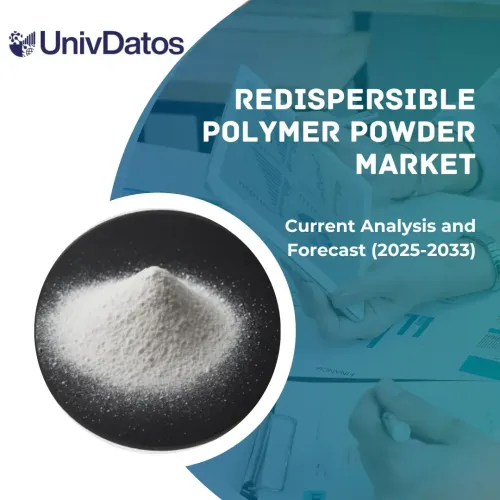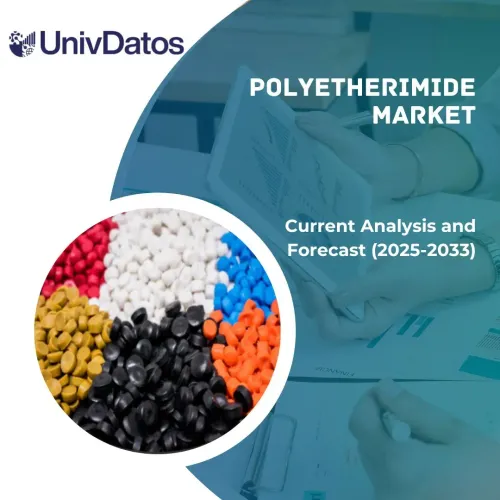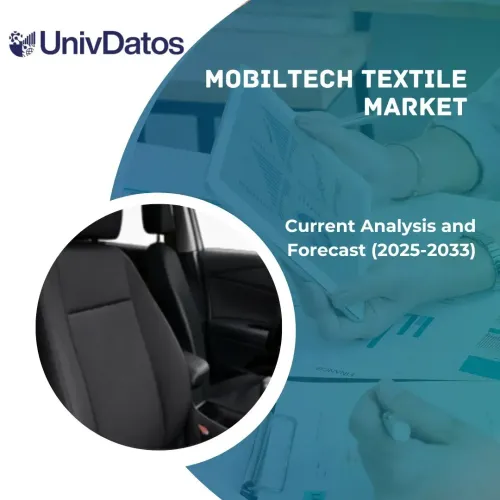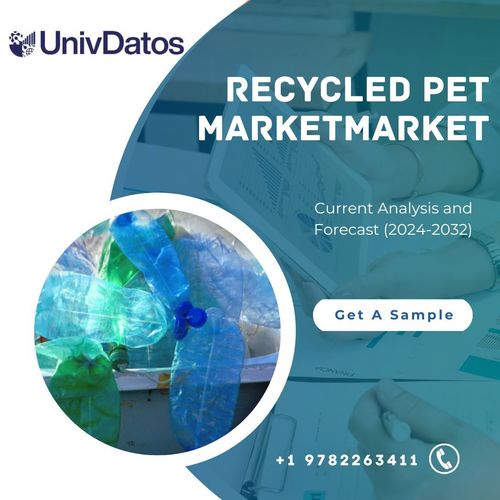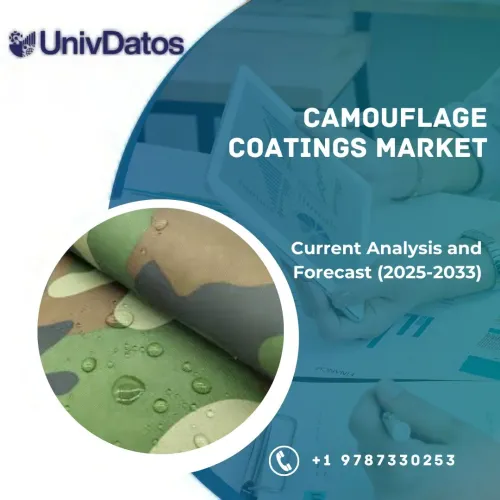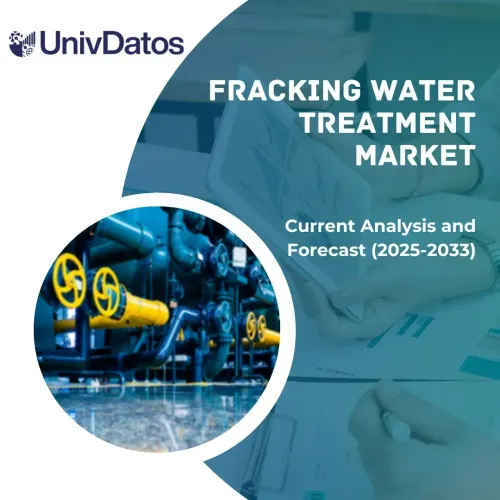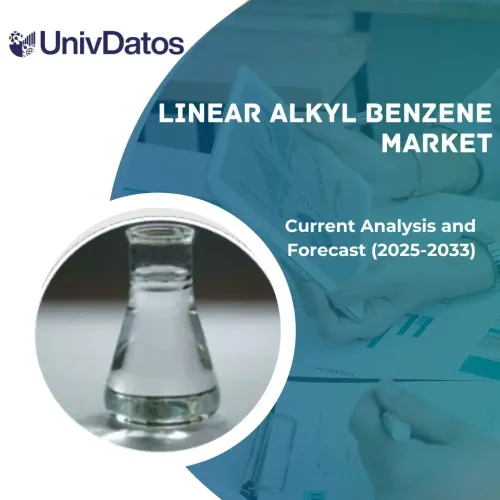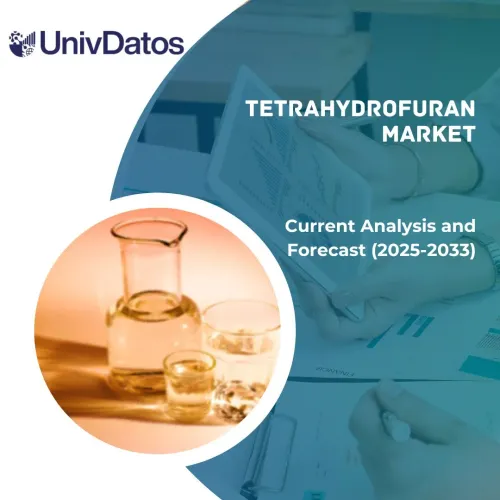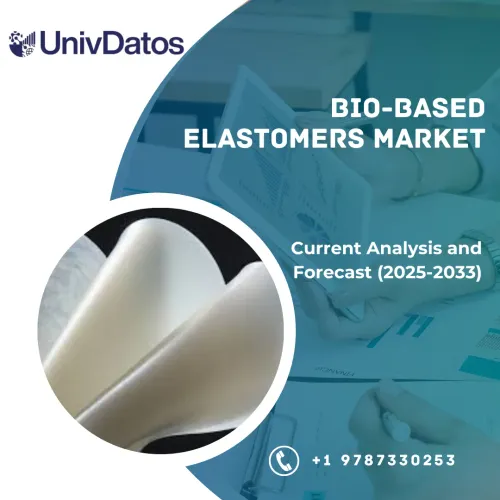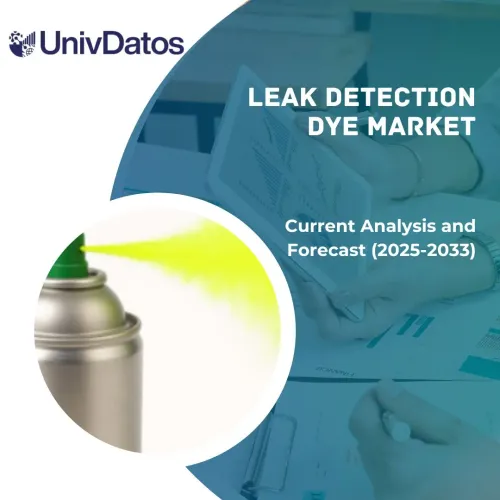- Home
- About Us
- Industry
- Services
- Reading
- Contact Us
Southeast Asia Personal Protective Equipment Market: Current Analysis and Forecast (2025-2033)
Emphasis on Product Type (Hand and Arm Protection, Head Protection, Eye and Face Protection, Respiratory Protection, Protective Clothing, Fall Protection, Protective Footwear, Hearing Protection, Others); End Use Industry (Healthcare, Construction, Manufacturing, Oil & Gas, Mining, Chemical, Others); and Country.
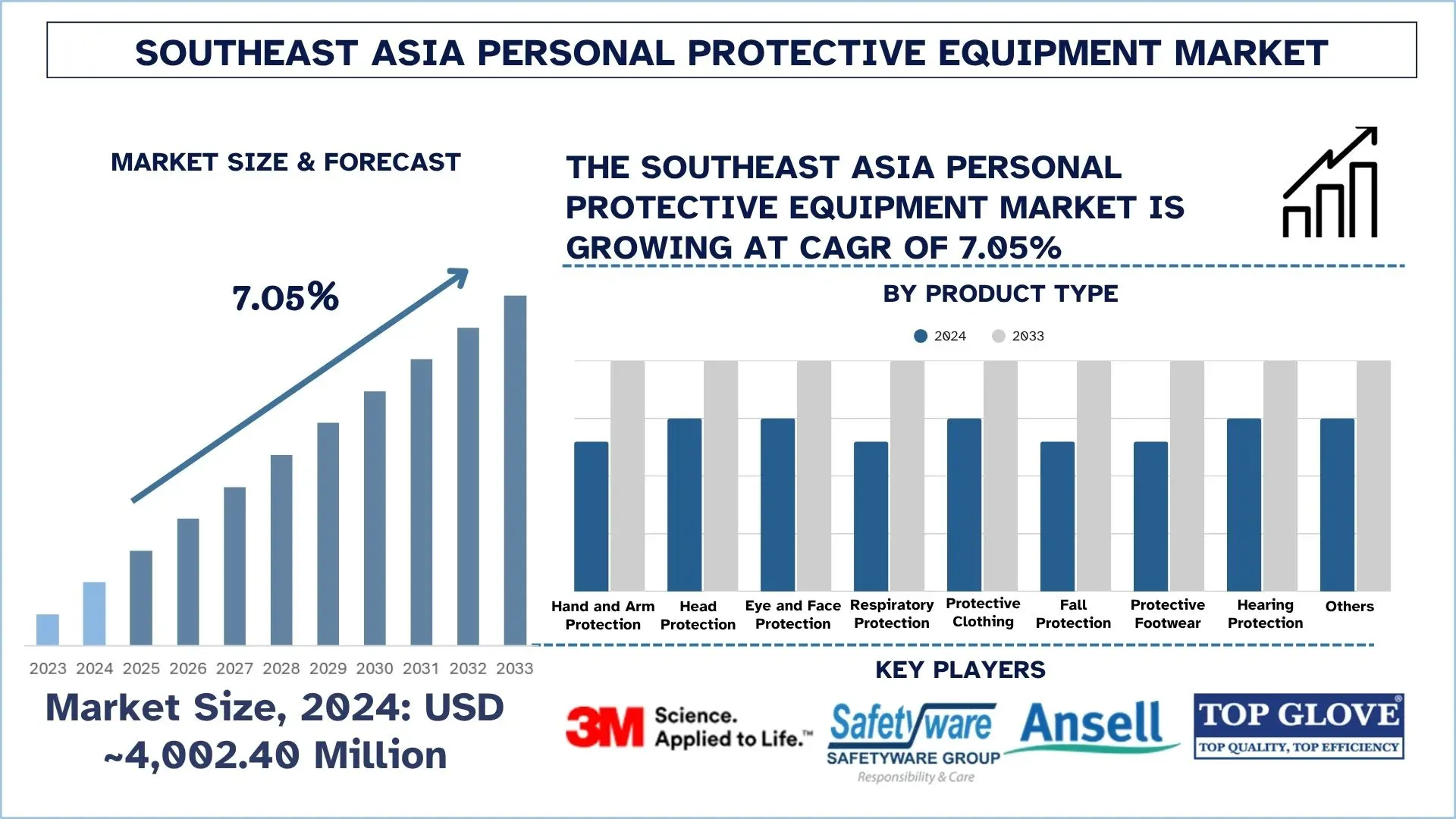
Southeast Asia Personal Protective Equipment Market Size & Forecast
The Southeast Asia Personal Protective Equipment Market was valued at USD 4,002.40 Million in 2024 and is expected to grow at a strong CAGR of around 7.05% during the forecast period (2025-2033F), driven by rapid industrialization across construction and manufacturing.
Southeast Asia Personal Protective Equipment Market Analysis
Personal Protective Equipment (PPE) is specialized clothing or gear used at workplaces to prevent hazards that can cause injury or illness to workers in the workplace, e.g., at construction sites, hospitals, and factories. It also incorporates such things as helmets, gloves, eye protection, masks, and safety footwear.
To drive the growth of the market, companies in Southeast Asia are shifting towards high-level PPE solutions, including automation, intelligent wearable devices, and environmentally friendly materials, to promote compliance with safety and enhance the efficiency of the workforce. The occupational health and safety standards are being tightened, and the industries are investing in PPE certification and quality upgrading. To address the increasing industrial and healthcare needs, manufacturers are targeting localized production, electronic distribution, and improvement of ergonomic design. E-commerce and B2B procurement systems are also transforming the way PPE is distributed, ensuring quicker access and more affordable provision throughout emerging economies.
On July 11, 2025, Top Glove, a Malaysia-based company, the world’s largest manufacturer of gloves, introduced the industry’s most extensively tested chemotherapy nitrile glove, offering exceptional protection against a wide range of high-risk compounds. This breakthrough glove is part of a trio of next-generation glove products that also includes a halogen-free nitrile cleanroom glove and a biodegradable diamond sandblast nitrile glove, collectively addressing critical demands across healthcare, cleanroom, and industrial sectors, while reinforcing Top Glove’s commitment to global safety standards and environmental stewardship.
Southeast Asia Personal Protective Equipment Market Trends
This section discusses the key market trends that are influencing the various segments of the Southeast Asia Personal Protective Equipment market, as found by our team of research experts.
Smart and Connected PPE Adoption
The use of smart and connected PPE is becoming a trend in the safety market of Southeast Asia. The companies are incorporating sensory, IoT, and real-time data systems into protective equipment to track the well-being of workers and the surrounding environment. To further contribute to this, smart helmets and connected gloves are assisting in monitoring fatigue, temperature variations, or exposure to dangerous gases, enhancing safety efficiency on-site. Furthermore, the growth in demand for smart PPE solutions is likely to be driven by high-risk industries such as oil and gas, construction, and manufacturing, as these sectors undergo digital transformation and predictive maintenance.
Southeast Asia Personal Protective Equipment Industry Segmentation
This section provides an analysis of the key trends in each segment of the Southeast Asia Personal Protective Equipment market, along with forecasts at the country level for 2025-2033.
The hand and arm protective equipment market dominated the market share in 2024.
Based on product type, the market is segmented into hand and arm protection, head protection, eye and face protection, respiratory protection, protective clothing, fall protection, protective footwear, hearing protection, and others. Among these, the hand and arm protective equipment market held the dominant share in 2024. This is mainly due to the rising awareness about hand and arm protection, which is one of the primary growth factors in the PPE market of Southeast Asia. The growth in industrial activities within the manufacturing, construction, and oil and gas sectors has increased exposure to mechanical, chemical, and thermal hazards, thereby strengthening safety compliance. Also, to minimize injuries in the workplace and comply with the international safety standards, companies invest in more sophisticated nitrile, neoprene, and cut-resistant fibre gloves. Additionally, the demand for comfort, durability, and protection is driving the use of high-quality protective products, especially in multinational manufacturing divisions. On October 01, 2025, Ansell Limited, a global leader in protection solutions, announced the launch of the HyFlex™ Precision Comfort Series with AEROFIT™ Technology. This new line of industrial gloves is designed to boost the precision and productivity of workers by providing a true second-skin fit for exceptional comfort and tactile control. Ansell Limited has a significant presence in Southeast Asia.
The healthcare segment is expected to grow with a significant CAGR during the forecast period (2025-2033).
Based on end use industry, the Southeast Asian Personal Protective Equipment market is segmented into healthcare, construction, manufacturing, oil & gas, mining, chemical, and others. Among these, the healthcare segment is expected to grow at a significant CAGR during the forecast period (2025-2033). The rise of hospital chains, medical tourism, and post-pandemic infection-controlling regulations has rendered PPE an irreplaceable aspect of clinical settings. The adoption has been enhanced by increased government expenditure on healthcare facilities and the sensitization of medical practitioners on occupational safety. Moreover, companies that produce certified materials such as surgical masks, gowns, and disposable gloves are experiencing steady demand, aided by purchases from both government health departments and individual hospitals in the region.
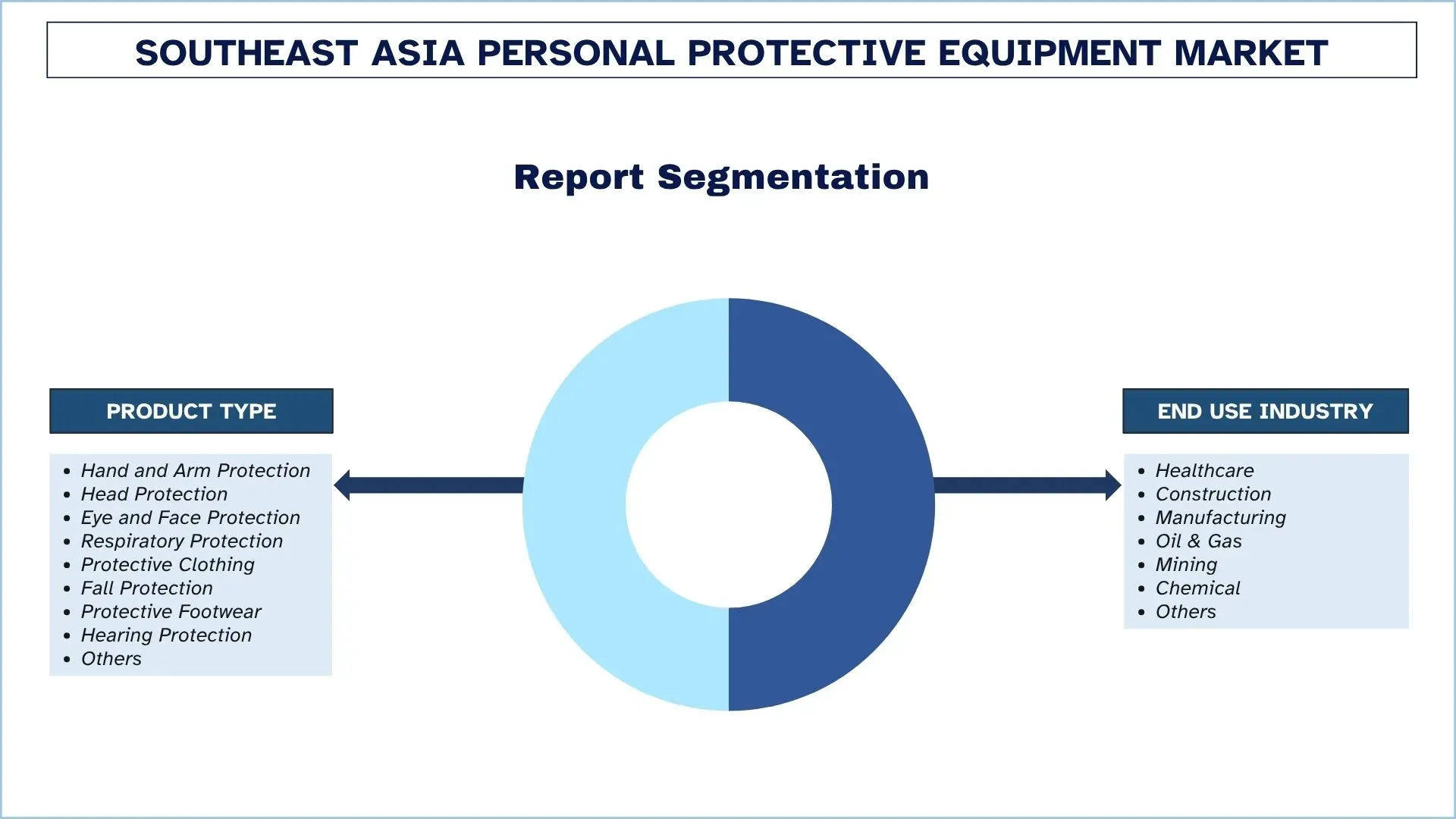
Indonesia held a dominant share of the Southeast Asian Personal Protective Equipment market in 2024
Indonesia held a dominant share of the PPE industry because of the huge manufacturing sector and high rate of infrastructure growth. The government incentive for workplace safety adherence in the mining, oil, and gas industry, as well as in the construction industry, has increased the need for PPE. Adding to this, the government incentives for industrial safety products and the local manufacturing capacity are allowing companies to scale more rapidly and decrease their dependence on imports. The market leadership of Indonesia is expected to further improve with the constant increase in industrial projects and workforce safety programs.
On March 11, 2025, FPT entered a partnership agreement with the Indonesian state-owned oil and natural gas corporation, Pertamina, to drive AI-powered innovation in the energy sector. FPT will provide advanced AI technologies to optimize asset inspection and maintenance across Pertamina’s operations, focusing on two key areas: enhancing asset reliability and improving workplace safety.
Additionally, at Pertamina Drilling Services Indonesia (PDSI) drilling sites, AI-powered systems will monitor compliance with personal protective equipment (PPE) regulations, helping minimize risks and maintain a secure working environment.
On September 19, 2025, the U.S. Defense Threat Reduction Agency (DTRA) partnered with the Indonesian National Armed Forces (TNI) and hosted a four-day training program on biosafety, biosecurity, biorisk management, and epidemiology from September 15-18, 2025, at the Putri Hijau Army Hospital in Medan, North Sumatra. The program included interactive sessions, hands-on exercises, and case studies, covering topics such as disease surveillance, risk assessment, personal protective equipment (PPE) use, and laboratory waste management. Participants also engaged in tabletop exercises to develop practical skills in outbreak investigation and response.
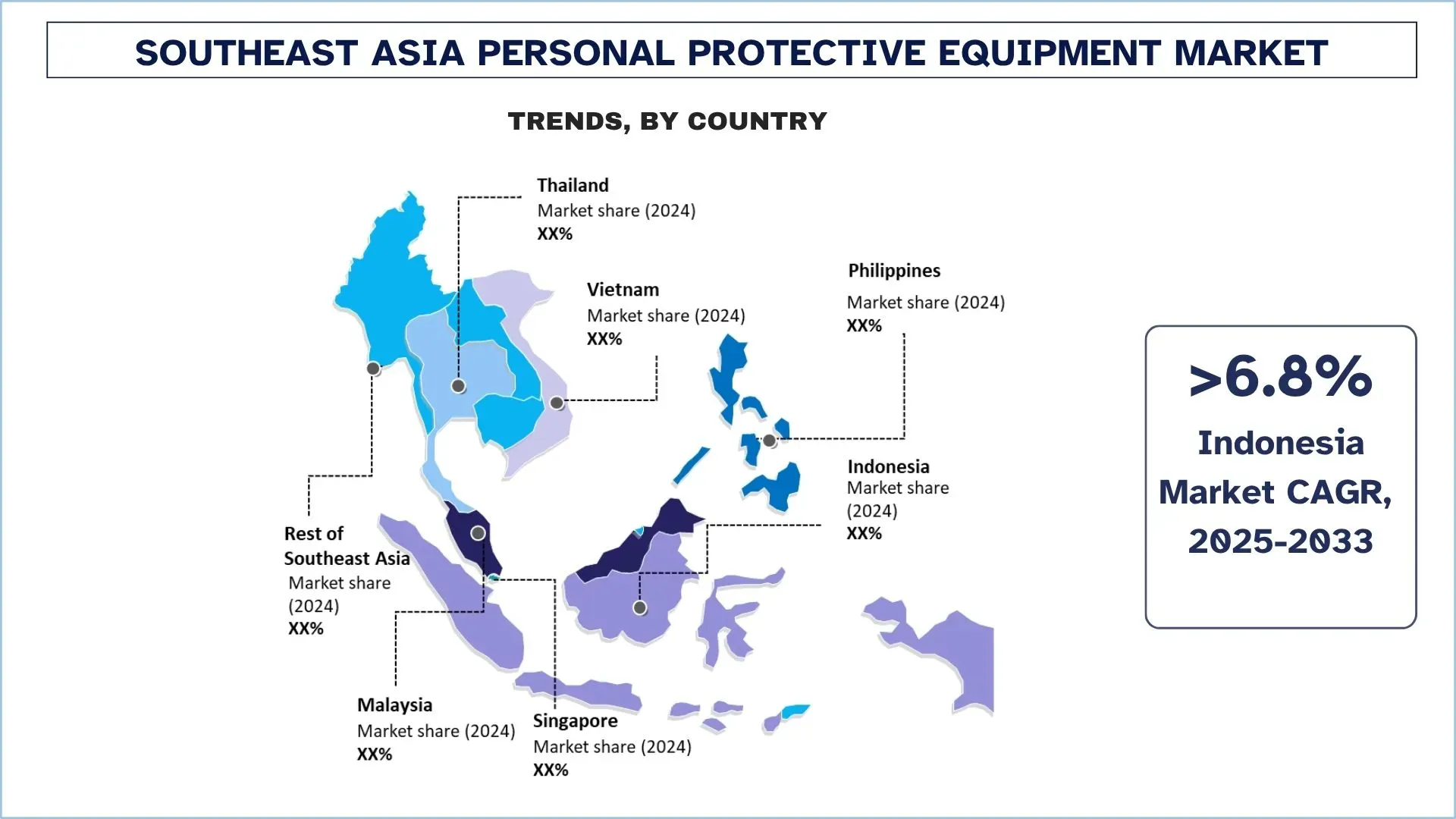
Southeast Asia Personal Protective Equipment Industry Competitive Landscape
The Southeast Asia Personal Protective Equipment market is competitive, with several global and international market players. The key players are adopting different growth strategies to enhance their market presence, such as partnerships, agreements, collaborations, new product launches, geographical expansions, and mergers and acquisitions.
Top Southeast Asia Personal Protective Equipment Companies
Some of the major players in the market are 3M, Safetyware Group Berhad, DuPont, ANSELL LTD., MSA Safety (MSA Worldwide, LLC), Delta Plus Services, Lakeland Inc., uvex group, Drägerwerk AG & Co. KGaA, and Top Glove Corporation Bhd.
Recent Developments in the Southeast Asia Personal Protective Equipment Market
On May 22, 2025, Protective Industrial Products, Inc. (“PIP®”) announced the completion of its acquisition of Honeywell’s Personal Protective Equipment (PPE) Business. The acquired business includes globally recognized brands such as Fendall™, Fibre-Metal™, Howard Leight™, KCL™, Miller™, Morning Pride™, North™, Oliver™, Salisbury™, and others. PIP is a portfolio company of Odyssey Investment Partners, LLC. This acquisition creates a world-class portfolio of protective equipment and solutions through the addition of powerful brands and products that are highly complementary to PIP’s. The combination broadens and strengthens PIP’s head-to-toe protection offering, covering worker safety, electrical safety, hearing protection, head protection, respiratory, fall protection, eye protection, footwear, first aid, and first responder equipment.
On July 2, 2024, Ansell Limited, a global leader in protection solutions, announced it had successfully completed the acquisition of Kimberly-Clark's Personal Protective Equipment (KCPPE) business. This strategic acquisition strengthens Ansell’s position as a global leader in personal protection solutions, expands its product portfolio, and enhances its service capabilities to meet customer needs across industries and geographic markets. As part of this agreement, Ansell will acquire the Kimtech™ brand of scientific PPE for customers in laboratory and cleanroom environments and the KleenGuard™ brand of safety PPE for customers in industrial environments.
Southeast Asia Personal Protective Equipment Market Report Coverage
Report Attribute | Details |
Base year | 2024 |
Forecast period | 2025-2033 |
Growth momentum | Accelerate at a CAGR of 7.05% |
Market size 2024 | USD 4,002.40 Million |
Country analysis | Indonesia, Thailand, Philippines, Vietnam, Malaysia, Singapore, Rest of Southeast Asia |
Major contributing Country | The Philippines is expected to grow at the highest CAGR during the forecasted period. |
Companies profiled | 3M, Safetyware Group Berhad, DuPont, ANSELL LTD., MSA Safety (MSA Worldwide, LLC), Delta Plus Services, Lakeland Inc., uvex group, Drägerwerk AG & Co. KGaA, Top Glove Corporation Bhd. |
Report Scope | Market Trends, Drivers, and Restraints; Revenue Estimation and Forecast; Segmentation Analysis; Demand and Supply Side Analysis; Competitive Landscape; Company Profiling |
Segments Covered | By Product Type, By End Use Industry, By Country |
Reasons to Buy the Southeast Asia Personal Protective Equipment Market Report:
The study includes market sizing and forecasting analysis confirmed by authenticated key industry experts.
The report briefly reviews overall industry performance at a glance.
The report covers an in-depth analysis of prominent industry peers, primarily focusing on key business financials, product portfolios, expansion strategies, and recent developments.
Detailed examination of drivers, restraints, key trends, and opportunities prevailing in the industry.
The study comprehensively covers the market across different segments.
Customization Options:
The Southeast Asia Personal Protective Equipment market can further be customized as per requirements or any other market segment. Besides this, UnivDatos understands that you may have your own business needs; hence, feel free to contact us to get a report that completely suits your requirements.
Table of Content
Research Methodology for the Southeast Asia Personal Protective Equipment Market Analysis (2023-2033)
We analyzed the historical market, estimated the current market, and forecasted the future market of the Southeast Asian Personal Protective Equipment market to assess its application in major countries. We conducted exhaustive secondary research to gather historical market data and estimate the current market size. To validate these insights, we carefully reviewed numerous findings and assumptions. Additionally, we conducted in-depth primary interviews with industry experts across the Southeast Asian Personal Protective Equipment value chain. After validating market figures through these interviews, we used both top-down and bottom-up approaches to forecast the overall market size. We then employed market breakdown and data triangulation methods to estimate and analyze the market size of industry segments and sub-segments.
Market Engineering
We employed the data triangulation technique to finalize the overall market estimation and derive precise statistical numbers for each segment and sub-segment of the Southeast Asia Personal Protective Equipment market. We split the data into several segments and sub-segments by analyzing various parameters and trends, including product type, end use industry, and country within the Southeast Asian Personal Protective Equipment market.
The Main Objective of the Southeast Asia Personal Protective Equipment Market Study
The study identifies current and future trends in the Southeast Asia Personal Protective Equipment market, providing strategic insights for investors. It highlights market attractiveness, enabling industry participants to tap into untapped markets and gain a first-mover advantage. Other quantitative goals of the studies include:
Market Size Analysis: Assess the current and forecast market size of the Southeast Asia Personal Protective Equipment market and its segments in terms of value (USD).
Southeast Asia Personal Protective Equipment Market Segmentation: Segments in the study include areas of product type, end use industry, and country.
Regulatory Framework & Value Chain Analysis: Examine the regulatory framework, value chain, customer behavior, and competitive landscape of the Southeast Asia Personal Protective Equipment industry.
Country Analysis: Conduct a detailed country analysis for key areas such as Indonesia, Thailand, the Philippines, Vietnam, Malaysia, Singapore, and the Rest of Southeast Asia.
Company Profiles & Growth Strategies: Company profiles of the Southeast Asia Personal Protective Equipment market and the growth strategies adopted by the market players to sustain in the fast-growing market.
Frequently Asked Questions FAQs
Q1: What is the Southeast Asia Personal Protective Equipment market’s current market size and growth potential?
The Southeast Asia Personal Protective Equipment market was valued at USD 4,002.40 Million in 2024 and is projected to expand at a CAGR of 7.05% from 2025 to 2033. The growth is driven by rapid industrialization, stricter workplace safety regulations, and increasing demand from the healthcare and manufacturing sectors.
Q2: Which segment has the largest share of the Southeast Asia Personal Protective Equipment market by product type?
The hand and arm protection segment dominates the market, driven by high usage in manufacturing, construction, and healthcare industries to prevent workplace injuries and ensure compliance with safety standards.
Q3: What are the driving factors for the growth of the Southeast Asia Personal Protective Equipment market?
Major growth drivers include rapid industrial expansion, post-pandemic health awareness, rising safety compliance mandates, growth in healthcare infrastructure, and the integration of smart and sustainable PPE technologies.
Q4: What are the emerging technologies and trends in the Southeast Asia Personal Protective Equipment market?
Key trends include the adoption of smart and connected PPE, increasing use of lightweight and ergonomic designs, localization of manufacturing, and a shift toward eco-friendly and recyclable PPE materials across the region.
Q5: What are the key challenges in the Southeast Asia Personal Protective Equipment market?
Companies face challenges such as high costs of certified PPE, inconsistent safety enforcement across industries, fluctuating raw material prices, and limited awareness in smaller or informal sectors.
Q6: Which country dominates the Southeast Asia Personal Protective Equipment market?
Indonesia leads the market due to its large industrial base, government focus on workplace safety, and expanding construction and manufacturing sectors, which drive strong domestic PPE demand.
Q7: Who are the key players in the Southeast Asia Personal Protective Equipment market?
Leading companies in the Southeast Asia Personal Protective Equipment market include:
• 3M
• Safetyware Group Berhad
• DuPont
• ANSELL LTD.
• MSA Safety (MSA Worldwide, LLC)
• Delta Plus Services
• Lakeland Inc.
• uvex group
• Drägerwerk AG & Co. KGaA
• Top Glove Corporation Bhd
Q8: What opportunities exist for new entrants in the Southeast Asia Personal Protective Equipment market?
There are strong opportunities in localized PPE manufacturing, sustainable material innovation, and digital distribution networks. Rising industrial projects and regional health initiatives are creating room for new players to establish cost-efficient and compliant PPE production.
Q9: How is technology transforming the Southeast Asia Personal Protective Equipment market?
The integration of IoT, sensor-based wearables, and data analytics is transforming PPE into smart systems capable of real-time health monitoring and risk detection. This shift is improving workplace efficiency and opening high-value growth avenues for tech-driven PPE providers.
Related Reports
Customers who bought this item also bought

